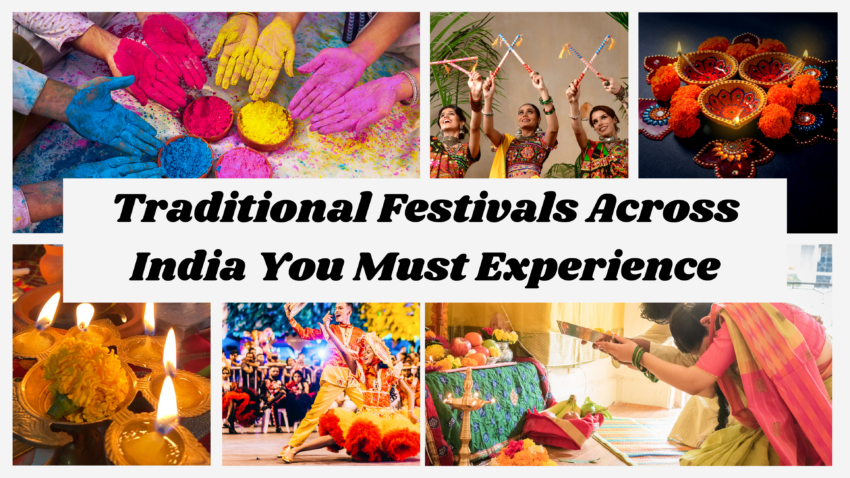India, a land of diverse cultures, languages, and traditions, is home to many festivals celebrated with grandeur and enthusiasm. These festivals are deeply rooted in history, mythology, and religious beliefs, offering a glimpse into the country’s rich heritage. Here are some of the most significant traditional festivals across India that you must experience at least once in your lifetime.
1. Diwali – The Festival of Lights
When: October–November
Where: Nationwide
Diwali, one of the most widely celebrated festivals in India, marks Lord Rama’s return to Ayodhya after defeating Ravana. The festival is characterized by the lighting of diyas (oil lamps), the bursting of firecrackers, and the exchange of sweets. Homes are decorated with rangoli and vibrant lights, symbolizing the victory of light over darkness.
2. Holi – The Festival of Colors
When: March
Where: Nationwide, particularly in Uttar Pradesh, Rajasthan, and West Bengal
Holi is a joyous festival that signifies the arrival of spring and the triumph of good over evil. Celebrants throw colored powders, splash water, and dance to music. The festival has a special significance in Vrindavan and Mathura, where Lord Krishna is believed to have played Holi with Radha and the Gopis.
3. Navratri and Durga Puja
When: September–October
Where: Gujarat (Navratri), West Bengal (Durga Puja), Karnataka (Mysore Dasara)
Navratri is a nine-night festival dedicated to Goddess Durga, celebrated with fasting, dance, and music, especially in Gujarat, where Garba and Dandiya Raas are performed. In West Bengal, Durga Puja is a grand affair with elaborately decorated pandals, artistic idols, and cultural performances.
4. Ganesh Chaturthi – The Birth of Lord Ganesha
When: August–September
Where: Maharashtra, Karnataka, Telangana
Ganesh Chaturthi marks the birth of Lord Ganesha and is celebrated with great fervor, especially in Mumbai and Pune. Idols of Ganesha are installed in homes and public pandals, followed by prayers, bhajans, and grand processions for immersion (Visarjan).
5. Pongal – The Harvest Festival of Tamil Nadu
When: January
Where: Tamil Nadu
Pongal is a four-day festival celebrated to thank the Sun God for a bountiful harvest. People prepare a special dish called ‘Pongal’ made from newly harvested rice, decorate their homes with kolams (rangoli), and conduct bull-taming events like Jallikattu.
6. Onam – The Festival of Kerala
When: August–September
Where: Kerala
Onam is a harvest festival that celebrates the return of the mythical King Mahabali. The festival is known for its grand feast (Onasadya), boat races (Vallam Kali), traditional dance forms like Kathakali, and the creation of floral rangoli (Pookalam).
7. Bihu – Assam’s Harvest Festival
When: January, April, October
Where: Assam
Bihu is celebrated in three forms—Bohag Bihu (New Year), Magh Bihu (harvest), and Kati Bihu (pre-harvest). The festival features traditional Bihu dance, folk music, feasts, and games like buffalo fighting.
8. Lohri – The Punjabi Winter Festival
When: January
Where: Punjab, Haryana, Himachal Pradesh
Lohri marks the end of winter and the harvest of the rabi crop. People gather around bonfires, sing folk songs, and dance the energetic Bhangra and Gidda.
9. Eid-ul-Fitr and Eid-ul-Adha
When: Varies as per the Islamic lunar calendar
Where: Nationwide, especially in Uttar Pradesh, Hyderabad, and Kerala
Eid-ul-Fitr marks the end of Ramadan, the Islamic holy month of fasting, with prayers, feasting, and charity. Eid-ul-Adha, or the Festival of Sacrifice, commemorates the devotion of Prophet Ibrahim.
10. Christmas – The Birth of Jesus Christ
When: December 25
Where: Goa, Kerala, Tamil Nadu, and metropolitan cities
Christmas is celebrated with midnight Mass, decorated churches, carol singing, and grand feasts. Goa, with its colonial churches and vibrant celebrations, is a popular destination for experiencing Christmas festivities.
11. Raksha Bandhan – The Bond of Siblings
When: August
Where: Nationwide
Raksha Bandhan is a festival symbolizing the bond between brothers and sisters. Sisters tie a sacred thread (Rakhi) on their brothers’ wrists, praying for their well-being, while brothers pledge to protect their sisters.
12. Makar Sankranti – The Kite Flying Festival
When: January 14
Where: Gujarat, Rajasthan, Maharashtra, Karnataka
Makar Sankranti is a harvest festival celebrated with kite flying, sesame sweets, and community gatherings. In Gujarat, the festival transforms the sky into a colorful spectacle with kites soaring high.
13. Kumbh Mela – The Largest Religious Gathering
When: Every 12 years
Where: Prayagraj, Haridwar, Ujjain, Nashik
Kumbh Mela is the world’s largest spiritual gathering, where millions of pilgrims take a holy dip in sacred rivers to cleanse their sins. This event is marked by religious discourses, fairs, and cultural performances.
Conclusion
Experiencing these festivals firsthand provides deep insights into India’s cultural and spiritual richness. Whether it is the colorful Holi, the grand Diwali, or the solemnity of Eid, each festival showcases India’s unique traditions and communal harmony. So, pack your bags and immerse yourself in the vibrant festivities of India!
Read this Article – Exploring the Spiritual Side: Top Pilgrimage Destinations in India
Disclaimer:
The information provided on this website is for general informational purposes only. While we strive to keep the information accurate and up to date, we make no representations or warranties of any kind, express or implied, about the completeness, accuracy, reliability, suitability, or availability concerning the website or the information, products, services, or related graphics contained on the website for any purpose. Any reliance you place on such information is therefore strictly at your own risk. We do not guarantee the accuracy, timeliness, performance, completeness, or suitability of the information and materials found or offered on this website for any particular purpose. You acknowledge that such information and materials may contain inaccuracies or errors, and we expressly exclude liability for any such inaccuracies or errors to the fullest extent permitted by law. In no event will we be liable for any loss or damage including without limitation, indirect or consequential loss or damage, or any loss or damage whatsoever arising from loss of data or profits arising out of, or in connection with, Through this website, you may be able to link to other websites that are not under our control. We have no control over the nature, content, and availability of those sites. The inclusion of any links does not necessarily imply a recommendation or endorse the views expressed within them. Every effort is made to keep the website up and running smoothly. However, we take no responsibility for and will not be liable for the website being temporarily unavailable due to technical issues beyond our control. The information provided on this website is not intended to replace or substitute professional advice. It is advisable to seek the advice of qualified professionals regarding specific situations or circumstances. We reserve the right to modify, update, or remove any information on this website without prior notice. By using this website, you agree to the terms of this disclaimer. If you do not agree with any part of this disclaimer, please do not use our website.

